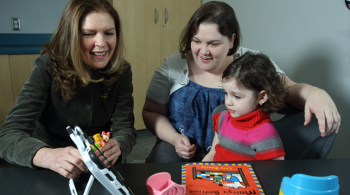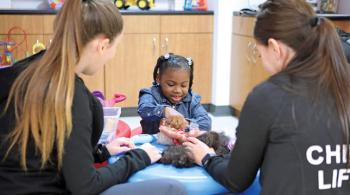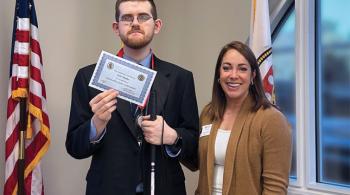BALTIMORE, January 22 2025—A new study conducted at Kennedy Krieger Institute has revealed insights into the reality of suicide risk among children with neurological, developmental, and behavioral disorders. The research shows the importance of universal suicide risk screening in pediatric outpatient settings, with findings suggesting that children as young as eight years old may be at risk.
With the rising concern for suicide in children, screening for risk is being recommended in pediatric health care settings. At Kennedy Krieger Institute, its medical and behavioral health clinics routinely screen children aged eight and older for suicidal thoughts and behaviors using the Ask Suicide-Screening Questions (ASQ) tool as part of their clinical care. The ASQ is a brief, evidence-based screening tool with four straightforward yes-or-no questions that help clinicians quickly identify individuals at risk for suicide.
Researchers reviewed over 10,000 screenings that took place for children between the ages of 8 and 17, with over 1,000 positive results found across Kennedy Krieger’s specialty clinics.
“Suicide is the second leading cause of death in children and young adults, and universal screening allows us to identify children whose suicidal thoughts and behaviors may otherwise go undetected,” said Dr. Allison Gornik, a clinical psychologist and member of the research team. “Children with neurodevelopmental differences should not be overlooked or excluded from these screenings. Our data show they have comparable, and in some cases elevated, risks when compared to their neurotypical peers.”
Key Findings
- 10.3% of the 10,970 children aged 8-17 screened reported suicidal thoughts or behaviors.
- Positive suicide screenings occurred in medical clinics (7.9% positive), autism-focused specialty clinics (12.7% positive), and behavioral/mental health clinics (12.2% positive).
- Positive screenings were more likely among older children, females, and cases where the child self-reported their suicidal thoughts.
- Almost one-third of screenings that were offered were declined, suggesting further work to be done on the acceptability of screening.
- These findings accompany additional research underway at Kennedy Krieger, involving suicidal ideation among children with autism.
The universal screening program at Kennedy Krieger was created due to national safety recommendations. Dr. Paul Lipkin, Professor of Pediatrics at Kennedy Krieger, emphasized the importance of asking children about suicidal thoughts.
“The simple act of asking children directly about their thoughts and feelings can save lives,” said Lipkin. “Knowing that a child is experiencing this allows us to engage in safety planning and connecting the family with resources. The Kennedy Krieger screening program can serve as a model for other places as we strive to help children and families nationwide.”
Visit our website learn more about Kennedy Krieger’s neuropsychological programs and research.
###
About Kennedy Krieger Institute:
Kennedy Krieger Institute, an internationally known nonprofit organization located in the greater Baltimore-Washington, D.C., region, transforms the lives of more than 27,000 individuals a year through inpatient and outpatient medical, behavioral health and wellness therapies; home and community services; school-based programs; training and education for professionals; and advocacy. Kennedy Krieger provides a wide range of services for children, adolescents and adults with diseases, disorders and injuries that impact the nervous system, ranging from mild to severe. The Institute is home to a team of investigators who contribute to the understanding of how disorders develop while at the same time pioneering new interventions and methods of early diagnosis, prevention and treatment. Visit KennedyKrieger.org for more information about Kennedy Krieger.















